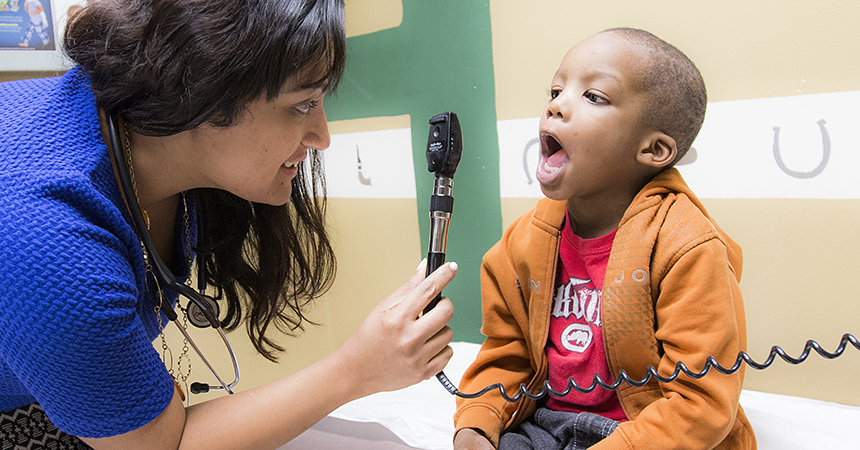Pandemic spurs pediatric faculty and students to create mental health plan calls
It was mid-March, as COVID-19 was spreading across the world, when Texas College of Osteopathic Medicine’s Dr. Priya Bui, an Assistant Professor in Pediatrics, started seeing an even more disturbing trend. Local cases of child abuse were rising, and fast.
The stress, anxiety and other factors brought on by the pandemic for adults, was creating even more problems for children.
“During this time, I started to think of how essential things come up in ‘medically non–essential visits’ Dr. Bui said. “Things such as stress levels in family, food insecurity, children having concerning behaviors or parents being overwhelmed with the impact of children at home, school at home or work at home.
Dr. Bui knew something had to be done. She partnered with Dr. Michael Petrus-Jones, who at the time was nearing his own graduation as a fourth-year medical student, and Research Coordinator Joanna Garcia to create the Pediatric Mental Health Calls.
“At the very beginning of the pandemic, when many of our rotations were transitioned to virtual courses, I was eager to find a way to help the community as a soon-to-be physician,” Dr. Petrus-Jones said. “I heard that the Health Pavilion was going to close its doors to in-person visits and reached out to Dr. Bui to see if there was some way I could help her and the clinic. She expressed concern for increased reports of child abuse during isolation and we brainstormed ways that might help alleviate stress for families.”
Led by Dr. Bui, Petrus-Jones and Garcia crafted the program to have medical students call patients to check on their mental health, and if needed, to follow up with a healthcare provider. The students worked from a script when making the calls, which included age-based conversation, guidance and even screeners for situations like teenage depression should they encounter that.
Getting volunteers for the project wasn’t hard. TCOM fourth-year students started making calls, and third-year students Holy Chor and Marcus Villarreal jumped at the opportunity to pitch in during the pandemic.
“I remember thinking that it was amazing how the team of fourth-year medical students at TCOM were addressing the issue of rising child abuse deaths through these phone calls,” Chor said. “They’ve all graduated and moved on to residency now. It’s been so rewarding for me to fill in their shoes and call patients myself.”
“When Dr. Bui approached me about volunteering, I felt a responsibility as a future healthcare provider to help out in any way I could, and I was glad to do so,” Villarreal said.
After a few weeks of quick preparation, the first calls started going out in April. The only question left would be how would the patients react to getting cold calls from health care providers?
“The patients were grateful to know that we are there for them,” Villarreal said “A lot of the time, our calls serve as a reminder that their mental health and wellbeing continue to matter. We talk mostly to parents and try to provide them with the space to voice concerns that they may think was not important enough to mention with the circumstances that many are facing. They are open to starting that conversation and we are glad to listen.”
The Pediatric Mental Health Calls has been an overwhelming success. Since the calls began in April, TCOM volunteers have made 2,300 calls.
Dr. Bui’s quick thinking and compassion led to the implementation of a new program that has the foundations of something special.
“This project was one of the most rewarding experiences of my time at TCOM,” Dr. Petrus-Jones said. “Being able to serve the Fort Worth community in a way that utilized my strengths and interests in pediatrics and public health was truly an awesome experience. Knowing that I was able to contribute so much as a student with autonomy and leadership was also rewarding and gave me confidence in myself as a new physician as I transitioned to pediatric residency.”
“Talking to these patients is a reminder to me on why I wanted to go into the medical field to begin with and why we study so hard in school,” Villarreal said. “I feel like I am making an impact in these patient’s lives and for me that’s all I can ask for right now.”







Social media